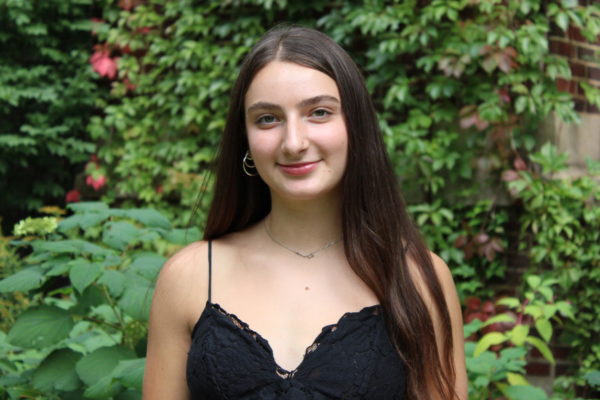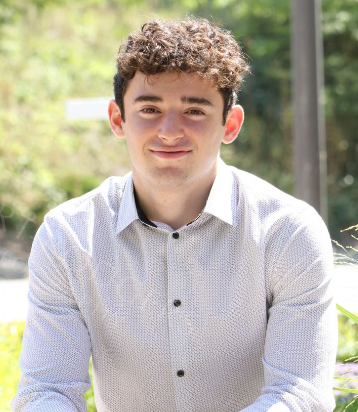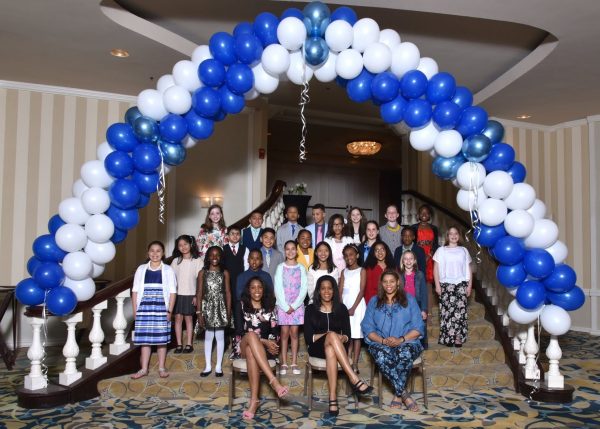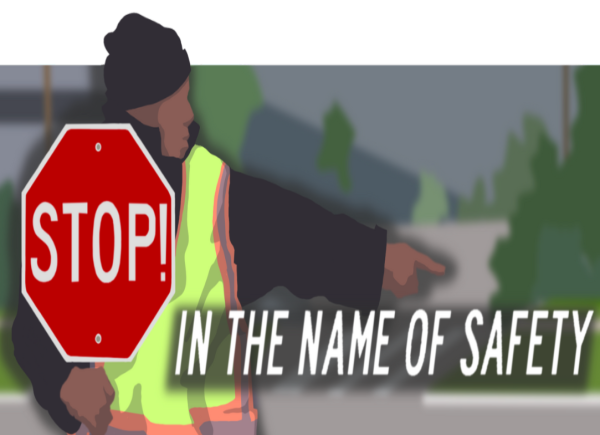ETHS student activists reshape civic engagement
Students demanding change is not a new fixture, however it has become more prevalent in recent years. ETHS students’ efforts to tackle issues in their communities should not be underestimated. With that, The Evanstonian was privileged to speak to three students about their day-to-day lives, both as activists and as people pushing for change.
Serena Brown – Black Student Union
Seventeen-year-old student activist Serena Brown decided to construct the Black Student Union during her junior year after a summer of prevalent activism, with Black Lives Matter rallies filling the void in a time of racial injustice. Brown intended on creating an environment in which Black students would not be exposed to discrimination, unfair criticism or any form of emotional or physical harm. Despite a full year of halted physical gatherings, her goal of implementing a safe space for Black students in the creation of ETHS’ Black Student Union to have their grievances heard was well executed.
Among other forms of involvement, Brown’s role as the president and founder of the Black Student Union has allowed for a new outlook on society that she didn’t experience prior to her engagement.
“The world is a lot bigger than yourself. [At ETHS], I might think, ‘Oh, I’m a pretty diverse person, like I’m female and I’m Black,’ but others have so many more experiences that I’ve never ever had to grapple with, and I think that’s the biggest thing,” Brown says. “BSU helps me see the world from other people’s perspectives and be more inviting of these differences.”
Brown emphasizes the importance of acknowledging racial barriers outside of ETHS. Recognizing the financial limits in sports and other extracurricular activities, Brown began teaching classes for minority students at her dance school. She hopes that exposing these students to dance at a young age will help to narrow the opportunity gap.
Additionally, Brown is a board member for the Civic Engagement Committee of the Community Service Club at ETHS, where subjects of public concern are closely inspected and addressed.
“We register people to vote, and we give books out that are focused on issues of race or gender or sexuality, just so that people in the community stay educated about issues,” she shares.
Word of mouth, flyers and announcements all play vital roles in informing the public about these opportunities.
Brown’s involvement in Civic Engagement has allowed her to possess a sense of awareness.
“I see the world totally different now. I recognize my place financially; there’s different things I’ve never had to think of, and, so, anytime I’m anywhere, I just try to be more aware of that and be a lot more accepting,” Brown expresses.
“I think to define yourself as an activist, you just have to always want to make change, and you can never be content where you are, because there’s always people being oppressed and always people that you can help. Through Civic Engagement and the Black Student Union, I’m always working to make the community more equitable,” she explains.
Despite the false judgement older generations have regarding social media and its presence in the lives of young people, Brown emphasizes social media’s ability to spread awareness to a substantial number of individuals.
“Social media is a huge connecting point. Older generations of people are like, ‘Oh, they love their Instagram,’ but it’s so helpful in spreading ideas and getting mass numbers of people focused on one issue,” Brown says. “I think that’s the biggest asset young people have.”
The process of having older generations listen to young people’s voices is at the core of Brown’s work.
“The biggest challenge is just getting our voices heard. We’re only in high school, and the oldest members are only 18. It’s getting people who can actually influence change.”
Brown hopes to see ETHS become more equitable in all capacities. In the past, the Black Student Union spoke out about the old detention policy, which disproportionately affected Black and brown students. BSU played a key part in refreshing the system, allowing ETHS students to enter the 2021-22 school year with a clean slate.
“I think that together, the Black Student Union and [the] Civic Engagement [Committee] can make a large impact for people of color in the community.”
Joie Cabrera – Asian Heritage Alliance
A severe lack of Asian representation within the Evanston community and beyond, coupled with the exposure of anti-Asian hate both due to COVID-19 and in general, has motivated senior Joie Cabrera to get involved in the Asian Heritage Alliance.
“Honestly, I didn’t do anything until my junior year, but after the Atlanta shooting on March 16 [of 2021], where eight people were killed, six of which were Asian women, I realized that I needed to do something because, previously, I always thought someone else would do it for me. I would say, ‘I don’t need to do this’ or ‘I don’t need to go out of my comfort zone,’” Cabrera says. “After the shooting, I really stepped up and felt a responsibility to do something for the Asian community.”
Though Cabrera didn’t begin her community involvement until just last year, she jumped in full force. Within the Asian Heritage Club, Cabrera hosts and facilitates meetings and teach-ins. Through her participation with outside organization KAN-WIN, whose mission is to eliminate gender-related brutality across Asian American communities through engagement and advocacy, Cabrera plays an essential role in their legal advocacy programs, as well as their youth group Elevate.
“I work with KAN-WIN as an intern, and I am involved in their legal advocacy program and literacy program. The literacy program works to help people experiencing domestic violence learn English, because there is a big barrier. As a whole, KAN-WIN empowers Asian women within America. Through an Asian youth group called Elevate, we talk about current events that are going on within America and Asia,” she shares.
KAN-WIN has allowed Cabrera to interact with students across the Northern Chicago area. As a collective unit, they facilitate monthly meetings and teach-ins at various schools, with a focus around supporting and comforting women.
Through her work with KAN-WIN, Cabrera has overcome self-doubt and gained a level of confidence that has allowed her to feel a sense of belonging.
“Even though I’m really scared of talking to people, I force myself to be in places that people don’t usually want me in. So, if I’m going to do a rally, obviously, I know people might disagree with me, but I’m going to force myself to be up there. I’m going to force people to listen to me and hear my voice and not let people speak over me,” she says.
As a senior, Cabrera hopes to continue her engagement while in college, keeping her focus on supporting Asian Americans intact. In some respects, an important aspect of activism is physically promoting and directing reform; however, embracing cultural diversity may be just as necessary. Cabrera has a clear vision for her future; she hopes to major in psychology and implement free therapy services for the Asian youth, as mental health in Asia is heavily stigmatized and extremely costly.
“I want to be able to empower more Asian people, because it’s really common within Asian culture to be quiet and be docile. I don’t like that anymore, because being quiet doesn’t make me happy,” Cabrera adds.
Anyone who meets Cabrera will quickly see she has found her voice and is speaking loud and clear on the issues that affect her most closely.
“I’m not doing it because someone asked me to do it; I’m doing it because I want to do it out of my own will. Activism is something that isn’t just, ‘Oh, I’m gonna post the infographic or my story,’ or talk about it on social media or once in class,” Cabrera shares. “Activism is more of a long-term commitment.”
Lily Aaron – Etown Sunrise
At only 17, ETHS senior Lily Aaron already has an impressive resume. As a board member for ETown Sunrise, an organizer for Evanston Fight for Black Lives (EFBL), member of Citizens’ Greener Evanston’s Board of Directors, and an attendee at the UN Climate Change Conference UK 2021 (COP26) in Glasgow, Scotland, Aaron’s passion revolves around climate awareness and activism. However, Aaron remembers a mayoral town hall she helped organize as her proudest achievement in the realm of civic engagement.
“We facilitated a town hall with all three mayoral candidates last year on the intersections of racial and climate justice in Evanston and how their campaigns would work to address it,” Aaron said. “We had a really great turnout, we asked some really awesome questions and engaged in really awesome conversations. A lot of Evanston voters got to see how now-Evanston mayor Daniel Biss’s campaign would attack these problems, so they got a better insight.”
Aaron’s civic engagement is not limited to one issue, though the majority of it revolves around topics of climate change, something she says she first became interested in during a trip to South America.
“It’s so unbelievably cliche, but it was, in fact, a service trip [that jump started my interest]. I had the privilege to attend a service trip surrounding coral restoration in a part of South America. It was very much a country that bore the brunt of the climate crisis in a way that a wealthy top emitter, like the US, simply did not see—or at least I did not see living in a fairly affluent ward of Evanston,” Aaron said. “[The service] surrounded scuba diving. So, you’d go in and there was this big grand notion that the water [would be] teeming with fish and the coral [would be] so pretty, but that was just not the case. Everything was bleached. And even beyond that, above the surface, you could see that these people depended on the water for their entire livelihood, and we were failing them.”
While this trip was responsible for much of Aaron’s engagement in climate activism, Aaron now has many goals she hopes to accomplish through civic engagement. That said, she has one top priority.
“The main focus is definitely implementing climate curriculum at ETHS and hopefully the broader Evanston school districts as well,” Aaron said. “Seeing as though Dr. Witherspoon is retiring, this is definitely the time for him to push for climate literacy. I can’t begin to fathom how he can simply leave without equipping entire generations of students for the crisis that his generation didn’t pull their weight on fixing,” Aaron said. “ETown Sunrise is in the process of coordinating efforts to push climate curriculum. We’re not entirely sure what that looks like yet, but [it should be] something that’s as long lasting as a mandatory course, whether that be something students can enroll in or is given to them through their freshmen science class or FASH. I think [that] is the best way to go about creating something that will live long past the time I graduate.”
Along with implementing such climate curriculum, Aaron views the intersections of climate change and racial justice as another focus of her civic engagement.
“I do a lot of organizing surrounding climate justice, specifically the intersections [of] food apartheid Evanston and regenerative agriculture,” said Aaron. “Honestly, my urban agriculture class last year really opened this door for me. We talked a lot about the presence of food apartheid in Chicago and Evanston, delving into the presence of redlining and how that…systematically makes it so that predominantly low-income Black and brown folks don’t have access to fresh produce….The power of regenerative agriculture [to] honor indigenous practices and provide produce that is not only organic and sustainable but is [also] healing the earth is really a double whammy, and I found that really, really empowering.”
Lily Aaron’s civic engagement extends beyond the high school to the broader Evanston and world stages. As a member of the Citizens’ Greener Evanston Board of Directors, Aaron works towards implementing the City of Evanston’s Climate Action and Resilience Plan and ending the disparate impacts of climate change between the city’s wards. And, in November, Aaron travelled to Glasgow, Scotland to participate in COP26.
“[I am looking forward to] delving into the ins and outs of global climate policy…I really want to get into the roots of grassroots organizing [and] highlighting why it’s important. Also, it’s obviously an international conference, and folks from around the world will be facilitating workshops, panels, and conversations on how the climate crisis affects them in their community. It’s a cool opportunity to open my eyes to what the climate crisis may look like elsewhere,” Aaron said.
And while she knows she wants to pursue “something surrounding Environmental Studies,” Aaron is not yet set on any college or career track that may continue her current work of civic engagement. For now, Aaron is focused on balancing her activism and school obligations.
“I do have to maintain a certain GPA, and I do the normal teenage things, [but] with the state of the climate crisis and the lack of action, I mean, we’re living in it, [so] it’s nothing that I can escape from at the moment.”
Your donation will support the student journalists of the Evanstonian. We are planning a big trip to the Journalism Educators Association conference in Philadelphia in November 2023, and any support will go towards making that trip a reality. Contributions will appear as a charge from SNOSite. Donations are NOT tax-deductible.











